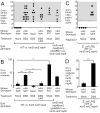Host-derived nitrate boosts growth of E. coli in the inflamed gut
- PMID: 23393266
- PMCID: PMC4004111
- DOI: 10.1126/science.1232467
Host-derived nitrate boosts growth of E. coli in the inflamed gut
Abstract
Changes in the microbial community structure are observed in individuals with intestinal inflammatory disorders. These changes are often characterized by a depletion of obligate anaerobic bacteria, whereas the relative abundance of facultative anaerobic Enterobacteriaceae increases. The mechanisms by which the host response shapes the microbial community structure, however, remain unknown. We show that nitrate generated as a by-product of the inflammatory response conferred a growth advantage to the commensal bacterium Escherichia coli in the large intestine of mice. Mice deficient in inducible nitric oxide synthase did not support the growth of E. coli by nitrate respiration, suggesting that the nitrate generated during inflammation was host-derived. Thus, the inflammatory host response selectively enhances the growth of commensal Enterobacteriaceae by generating electron acceptors for anaerobic respiration.
Figures



Comment in
-
IBD: Fertilizing the gut: host-derived nitrate contributes to Escherichia coli bloom in colitis.Nat Rev Gastroenterol Hepatol. 2013 Apr;10(4):197. doi: 10.1038/nrgastro.2013.32. Epub 2013 Feb 26. Nat Rev Gastroenterol Hepatol. 2013. PMID: 23438949 No abstract available.
-
Dysbiosis in the inflamed intestine: chance favors the prepared microbe.Gut Microbes. 2014 Jan-Feb;5(1):71-3. doi: 10.4161/gmic.27129. Epub 2014 Jan 29. Gut Microbes. 2014. PMID: 24637596 Free PMC article.
References
-
- Giaffer MH, Holdsworth CD, Duerden BI. The assessment of faecal flora in patients with inflammatory bowel disease by a simplified bacteriological technique. Journal of medical microbiology. 1991 Oct;35:238. - PubMed
Publication types
MeSH terms
Substances
Grants and funding
LinkOut - more resources
Full Text Sources
Other Literature Sources
Molecular Biology Databases

